Stay Informed
Popular Articles
- Hiatal Hernia: Hidden Cause of Chronic Illness
- Small Intestinal Bacterial Overgrowth (SIBO)
- Applied Lymphology: Unlocking the Secret to Pain Relief
- An Introduction to Constitutional Iridology
- The Low Down on Liver Detoxification
- An Energetic and Emotional Approach to Cancer
- Fat Facts
- Marrow in the Bones
- Blood Type and Nutrition
- Cardiac Herbs: Beyond Hawthorn
Quick Search
The School of Modern Herbal Medicine




Green Friends for a Healthy Red Heart
- 8/10/2009
This is page 3 of a three-part article.
For all these reasons, I believe we should always treat the heart emotionally as well as physically when we are trying to help someone with heart problems. Fortunately, herbs can treat the heart both emotionally and physically.
I have had a particular interest in learning about heart remedies because my father had a problem with atrial fibrillation and tachycardia. It was one thing I was not able to correct herbally. He had to have his heart stopped and restarted twice to correct this.
My youngest son developed the same problem in the womb, forcing my wife to undergo an emergency C-section. He also wound up having to have his heart stopped and restarted to correct its rhythm. They prescribed digitalis for him. I gave him a much lower dose than they recommended, along with hawthorn (which potentiates digitalis, by the way).
I have a lacuna in the heart area of my left iris. This is a sign of a family history of heart disease. My father had moderately high blood pressure and died of a stroke, but I think it goes much deeper than this. I have experienced a lot of grief and sadness in my life. Two of my seven children have died, and I have been through three divorces and the death of both of my parents.
A few years back, I had severe gum disease and spider veins on my nose. These are early warning signs of the chronic inflammation that leads to heart disease. I started taking Co-Q10 75 and have taken about 150 mg. per day for the last four years. My gums have healed and the spider veins are pretty much gone.
I've also had some moderate angina from time to time, associated primarily with stress and anxiety. Nervous Fatigue Formula and Magnesium Complex has been a big help with that. I'm also taking RG-Max, while starting on a custom cardiac blend with hawthorn blend (berries, leaves and flowers), a little lily of the valley, goldenrod and other herbs.
The bottom line is that I've been very interested in understanding how to treat the heart holistically, both for myself and others. As a result, I have learned a lot about heart remedies and I'm going to share some of what I've learned here.
But before I do, I want to stress that while supplements like Co-Q10, magnesium, l-arginine, l-carnitine and so forth can be really beneficial for the heart, they can't help the emotional aspects of heart disease the way herbs can.
That's because our green friends are electromagnetic beings, and our hearts can entrain on plant energies. In fact, Buhner explains that this is how native people talked to plants. They allowed their heart to synchronize with the electromagnetic frequency of the plant and then let the heart communicate its understanding to the brain.
So, our green friends are here not merely to help us heal physically; they can also help heal our wounded hearts. With that in mind, here are some of my favorite herbs for the heart.
Rose Re-opens the Closed Heart to Love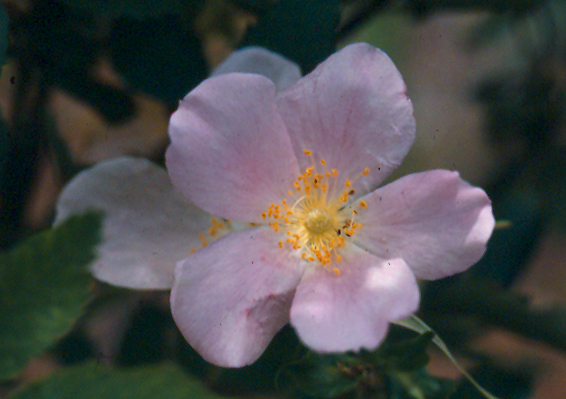 Rose is the primary heart remedy from an emotional standpoint. Both the essential oil of rose and the flower essence are used to awaken the healing powers of the heart. They help to open the heart to love and to heal from grief. The popularity of roses as a gift of love is directly linked to their ability to open the heart.
Rose is the primary heart remedy from an emotional standpoint. Both the essential oil of rose and the flower essence are used to awaken the healing powers of the heart. They help to open the heart to love and to heal from grief. The popularity of roses as a gift of love is directly linked to their ability to open the heart.
When I was first learning about aromatherapy, my instructor suggested I put a drop of rose oil on the pulse points on my wrist. In trying to do so, I accidently spilled a large quantity of the oil on my wrist. For the next two days, every time I brought my hands near my mouth I could smell roses. I experienced first hand the joy and light-heartedness that rose can bring. Since that time, I have used both the oil and the flower essence with people who are hard of heart or going through a grieving process to heal their wounded hearts.
The fruit of rose, the rose hips, contain vitamin C and bioflavonoids which strengthen the integrity of capillary membranes. They are helpful for nosebleeds, easy bruising, spider veins and the prevention of varicose veins, but this means they are also good for the heart in a similar manner to hawthorn. In fact, I maintain that most of the fruit trees in the rose family, including peaches, applies, apricots, pears, plums and cherries are also good for the heart energy. We also associate these fruits with objects of affection, as in “she's my peach,” “he's the apple of my eye,” and “her lips were like cherries.”
Hawthorn Revitalizes the Hurting Heart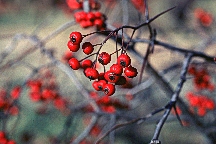 Although all members of the rose family probably help the heart to one degree or another, hawthorn stands out as the primary heart remedy in our Western herbal materia medica. Like other members of the rose family, it contains vitamin C and bioflavonoids and protects the blood vessels. It also reduces heat and inflammation throughout the body. The heart-shaped red berries, however, have particular affinity for the heart. And like rose, hawthorn can be used as a flower remedy for helping the heart to heal emotionally.
Although all members of the rose family probably help the heart to one degree or another, hawthorn stands out as the primary heart remedy in our Western herbal materia medica. Like other members of the rose family, it contains vitamin C and bioflavonoids and protects the blood vessels. It also reduces heat and inflammation throughout the body. The heart-shaped red berries, however, have particular affinity for the heart. And like rose, hawthorn can be used as a flower remedy for helping the heart to heal emotionally.
Studies around the world have confirmed that hawthorn berries improve the tone of the cardiac muscle, improve oxygen uptake by the heart, improve circulation in the heart, energize the heart cells, and dilate blood vessels in the extremities to reduce strain on the heart. These properties are not limited to the berries, however. Hawthorn flowers, leaves and twigs are also valuable for the heart and circulation.
Bleeding Heart Heals the Wounded Heart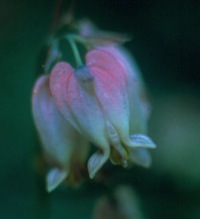 Along with wild rose, this is one of the flower essences I frequently use to help people's hearts to heal on an emotional level. If you've ever seen this flower, it looks like a heart that has cracked in two with a big drop falling from the middle of the crack, hence the name bleeding heart. This is the perfect signature for a broken heart, and that is exactly what bleeding heart is used to help.
Along with wild rose, this is one of the flower essences I frequently use to help people's hearts to heal on an emotional level. If you've ever seen this flower, it looks like a heart that has cracked in two with a big drop falling from the middle of the crack, hence the name bleeding heart. This is the perfect signature for a broken heart, and that is exactly what bleeding heart is used to help.
Bleeding heart helps people heal from grief. It is valuable for divorce, death of loved ones, or simply the break-up of relationships. It teaches people to “let go.” The heart longs for connection with other hearts, but when one of these connections is severed, one's heart has to learn to release that connection and be open to new ones. Bleeding heart helps facilitate this process.
It also teaches the heart that love has to exist in freedom. This is one of the most powerful lessons the heart has to learn. Often we try to control the people we love out of fear of losing them, and yet, this desire to control those we love is often what drives them away. We have to learn to love with an open heart, knowing that we cannot control the people we love and that they may choose not to return that love.
I highly recommend the combination of bleeding heart and rose flower essences for anyone who is going through loss or breakup of any kind. I've also seen it help people who have stuffed their grief and pain to get in touch with it and release it through a normal grieving process.
Borage Cheers the Discouraged Heart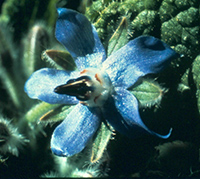 We've all heard the expression, “take heart.” The heart isn't just a seat of love, it's also an organ of courage. Our heart gives us courage to face life and go on living. Sometimes, we “lose heart” and feel discouraged or “dis-heartened.” That's where the flower essence of borage is helpful. It gives people's hearts the courage they need to face life by promoting cheerful courage in the face of adversity. It helps the heart be joyful.
We've all heard the expression, “take heart.” The heart isn't just a seat of love, it's also an organ of courage. Our heart gives us courage to face life and go on living. Sometimes, we “lose heart” and feel discouraged or “dis-heartened.” That's where the flower essence of borage is helpful. It gives people's hearts the courage they need to face life by promoting cheerful courage in the face of adversity. It helps the heart be joyful.
Motherwort Calms the Agitated Heart
This is a remedy I wish I had known about when I was trying to help my father and my son. I believe it would have helped them both. Motherwort is a primary remedy for tachycardia or rapid heart beat. It has a calming effect on the heart and acts as a vasodilator to help lower blood pressure.
This is a very safe cardiac remedy and if you have clients with rapid heartbeat or heart palpitations, consider using it. I also use it for hyperthyroid where a person is experiencing a rapid heartbeat.
Lobelia Relaxes the Tense Heart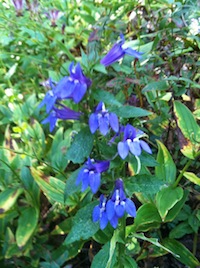 While you may not think of lobelia as a cardiac herb, it has a tremendous effect on the heart. Lobeline, the principle alkaloid in lobelia, binds to adrenergic receptors in the central nervous system to lower the heart rate while strengthening the heartbeat at the same time.
While you may not think of lobelia as a cardiac herb, it has a tremendous effect on the heart. Lobeline, the principle alkaloid in lobelia, binds to adrenergic receptors in the central nervous system to lower the heart rate while strengthening the heartbeat at the same time.
Because lobelia is an antispasmodic, it helps relax blood vessels and lower blood pressure. I had one client with a particularly difficult blood pressure problem that lobelia, in combination with other herbs, really helped.
The tinctures of lobelia and capsicum are very useful for heart attack victims en route to emergency care. At an NSP convention in Australia many years ago, one of the Managers had symptoms of a heart attack and I was asked to see what I could do while we were waiting for the ambulance to arrive. I gave him lobelia and capsicum extracts.
He asked me to ride in the ambulance with him and by the time we got to the hospital, he was doing much better. I think every first aid kit should have lobelia and capsicum.
Capsicum Fires Up the Cold Heart
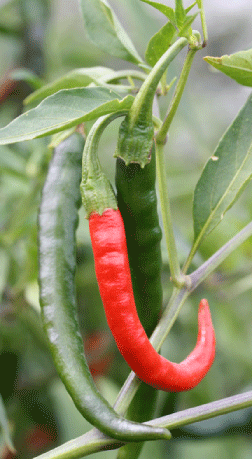 While we're talking about it, capsicum is a catalyst for circulation in general. It is not a specific remedy for the heart, but I generally use it in cardiac formulas because it equalizes circulation throughout the body.
While we're talking about it, capsicum is a catalyst for circulation in general. It is not a specific remedy for the heart, but I generally use it in cardiac formulas because it equalizes circulation throughout the body.
I didn't really understand what that phrase “equalizes circulation” meant until I learned pulse diagnosis from Matthew Wood. Matthew taught me that sometimes, when you feel the pulse on both wrists at the same time, the pulse feels “out of sync.” Instead of beating together, the two pulses feel like they are slightly different, not quite beating together.
Capsicum immediately corrects this. It helps blood to flow evenly and smoothly to all parts of the body. It's quite amazing. This is why anybody suffering from a heart attack should probably be given capsicum extract or powder (not capsules).
Arjuna and Coleus Nourish the Weakened Heart
Valued as a remedy for the heart in Ayurvedic medicine, arjuna is used to treat angina, low and high blood pressure, edema, congestive heart failure, and high cholesterol. I've seen it benefit a number of people with heart problems, so I keep it in stock.
Coleus is a circulatory tonic used to treat congestive heart failure and poor coronary blood flow. It is helpful when used with hawthorn for high blood pressure and is an ingredient in herbal formulas to reduce cholesterol.
Lily of the Valley Strengthens the Weak of Heart
I mentioned earlier that I have searched for cardiac remedies I can use when some of the standard remedies like hawthorn, garlic and capsicum aren't enough. This has led me to learn about and collect some potentially toxic botanicals that can be used for more serious heart problems. Lily of the Valley is one of these. You won't find it at the health food store. I'm able to get it because I'm a professional member of the American Herbalists Guild. It's not an herb for amateur herbalists.
Lily of the valley contains cardiac glycosides similar to the digitalis found in foxglove. It is less toxic than foxglove, however, so it is much safer to use. It is primarily beneficial for congestive heart failure, irregular heartbeat and angina. The way I use it is to combine it with other, less toxic, botanicals. This way, I not only get a synergistic effect, I also ensure that the dose of lily of the valley the person will be taking is well within safe limits.
When I have a client with a serious heart problem, I use muscle testing to decide which of my cardiac remedies they need. I then blend the individual tinctures into one formula. Lily of the valley and hawthorn are the two remedies that test strong for most people's serious heart problems, and I typically use them in combination with some of the remedies which follow. Remember, though, that these formulas are very customized.
Heart-Leafed Arnica Soothes the Bruised Heart
Arnica has an affinity for circulation, as shown by its ability to both prevent and heal bruising. The heart-leafed arnica is different from the arnica used for bruising because it has heart-shaped leaves and contains cardiac glycosides. I have made a tincture of the leaves and used small amounts in some of my cardiac formulas with great success, but have recently run out. I do have regular arnica, but the heart-leafed worked much better for cardiac problems.
Like lily of the valley, this is a potentially toxic remedy and great care needs to be taken in using it. However, I also made a flower essence of it and found that it works wonders on a bruised heart.
Scotch Broom Stimulates the Sluggish Heart
This is the last of the potentially toxic botanicals I've collected for heart problems. Scotch Broom contains an alkaloid known as sparteine which has an effect on the electrical conductivity of the heart muscle. Caution should be used with this herb, as it has been known to have life-threatening side effects to certain individuals with heart disease and who are taking heart medications. It is used to stimulate the heart and may be helpful for low blood pressure, abnormal heart rhythm and fluid retention in the legs. Again, I never use this herb by itself. It is always part of a blend so that the client is unlikely to be able to take a large enough dose to cause any problems.
Other Heart Remedies
There are, of course, other heart remedies besides those I've mentioned, but space does not permit discussing them. One is night-blooming cereus, a cactus plant that is used like hawthorn as a cardiac tonic. I have this remedy, but I have had almost no one muscle test for it, so I haven't found its specific application in my own healing work.
Then, there is holly flower essence, which is for jealousy and other vexations of the heart. It's a Bach flower remedy that also helps keep the heart open to love.
Finally, I should mention pink yarrow flower essence, which is for the person whose heart is too open. They are overly empathetic and too easily influenced by the emotions of others. It helps them to be more clear about what their heart is saying and what they are picking up from others.
These are some of the primary plant allies I employ in helping to treat “problems of the heart” both physically and emotionally. I trust you will find this information helpful in healing the many broken hearts in our society. I also hope reading this information will help you to start listening to your heart's wisdom. You'll be amazed at what your heart can teach you if you start to pay attention to it.
